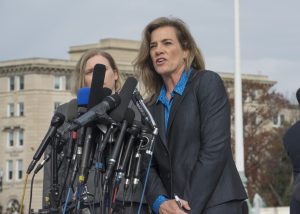The Baptist Joint Committee monitors rapidly changing church-state issues in all three branches of the federal government. Here are updates in our January/February 2018 magazine. Return to the website for the most current news affecting these and other issues.
Final tax bill does not repeal Johnson Amendment; more threats expected
The tax bill passed by congress and signed into law by President Donald Trump in December did not include any language affecting the “Johnson Amendment,” which is a name for part of the tax code that protects the nonpartisanship of houses of worship and other 501(c)(3) organizations. During final tax bill negotiations, the Senate parliamentarian ruled that language undermining it would violate the Byrd rule, so it was kept out. “This is a big win for churches, synagogues, mosques, all other 501(c)(3) nonprofits, and the people who rely on them as a vital part of our society,” said BJC Executive Director Amanda Tyler.
The change was stuck into a version of the tax bill on the fast track, but people of faith were instrumental in reminding Congress they did not want or need to alter that part of the law. The Johnson Amendment allows all 501(c)(3) organizations to speak out on political issues, but it protects them from the division that comes with endorsing or opposing candidates.
“Fortunately, as more Americans learned of the proposal and its likely impact, they raised their voices — calling and writing their representatives and senators, sharing concerns with their neighbors through local and social media, and joining thousands of faith leaders at Faith-Voices.org,” Tyler said. Other attempts to change the law are expected in 2018.
Supreme Court to hear new travel ban case
The U.S. Supreme Court announced it will hear a challenge to the latest version of President Donald Trump’s travel ban, including the specific question on whether it violates the Establishment Clause of the First Amendment by discriminating on the basis of religion. The ban at issue was released Sept. 24, 2017. It affects eight countries, six of which have populations with a Muslim majority. Arguments are expected in April with a decision released by June.
Court hears cake case
The Supreme Court heard Masterpiece Cakeshop v. Colorado on Dec. 5, a case involving a commercial baker who refused to make a wedding cake for a same-sex couple, despite a state public accommodation law. The BJC’s brief says a religious liberty exemption should not be granted when the actor is operating in the commercial context and not required to participate in a religious ceremony.
“Colorado’s law ensures equal treatment in the marketplace without regard to religion and other characteristics. That protection is good for religious liberty,” said BJC General Counsel Holly Hollman. A decision is expected by June.
For more on this case — including a podcast with Hollman — visit BJConline.org/Masterpiece.

HHS announces new division within Office for Civil Rights
The U.S. Department of Health and Human Services (HHS) announced the creation of a new division within its Office for Civil Rights (OCR) on Jan. 18. The “Conscience and Religious Liberty Division” will investigate religious liberty claims in the health care context — for instance, medical professionals who object to performing certain procedures that conflict with their religious beliefs. According to the HHS press release, the move “will provide HHS with the focus it needs to more vigorously and effectively enforce existing laws protecting the rights of conscience and religious freedom… .”
The new division does not signal a change in the law. The administration has released a proposed rule on how this office
will implement and enforce federal laws that protect providers’ conscience. It remains to be seen precisely how
these additional investigative and enforcement resources will be used in practice. Laws protecting conscience-based
objections have been in place for years. OCR Director Roger Serevino promises “change is coming” in the way government
treats conscience claims in the health care arena. The Baptist Joint Committee is particularly interested in how this change affects
the balance between protecting health care workers and the government’s duty to ensure nondiscrimination in services
and whether the change threatens to adversely affect patient care.
This article appeared in the January/February 2018 edition of Report from the Capital. You can also read the digital version of the magazine or view it as a PDF.






